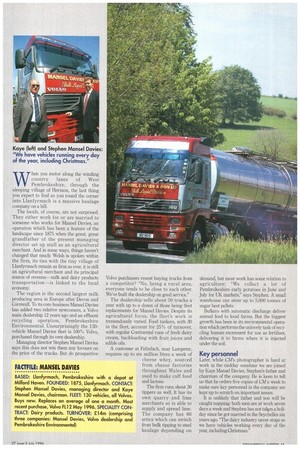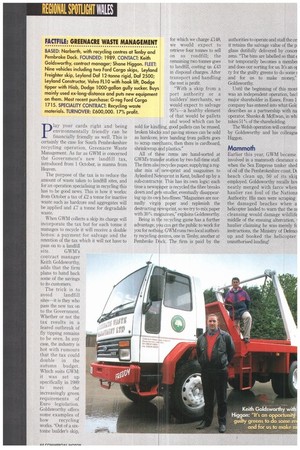W hen you motor along the winding country lanes of West
Page 100

Page 101

If you've noticed an error in this article please click here to report it so we can fix it.
Pembrokeshire, through the sleeping village of Hermon, the last thing you expect to find as you round the corner into Llanfyrmach is a massive haulage company on a hill.
The locals, of course, are not surprised. They either work for or are married to someone who works for Mansel Davies, an operation which has been a feature of the landscape since 1875 when the great, great grandfather of the present managing director set up stall as an agricultural merchant. And in some ways, things haven't changed that much: Welsh is spoken within the firm, its ties with the tiny village of Llanfyrmach remain as firm as ever, it is still an agricultural merchant and its principal source of revenue—milk and dairy products transportation—is linked to the local economy.
The region is the second largest milk producing area in Europe after Devon and Cornwall. To its core business Mansel Davies has added two relative newcomers, a Volvo main dealership 12 years ago and an effluent recycling operation, Pembrokeshire Environmental. Unsurprisingly the 130vehicle Manse! Davies fleet is 100% Volvo, purchased through its own dealership.
Managing director Stephen Mansel Davies says this does not win them any favours on the price of the trucks. But do prospective Volvo purchasers resent buying trucks from a competitor? "No, being a rural area, everyone tends to be close to each other. We've built the dealership on good service."
The dealership sells about 50 trucks a year with up to a dozen of those being fleet replacements for Manse! Davies. Despite its agricultural focus, the fleet's work is tremendously varied. Food tankers, with 30 in the fleet, account for 25% of turnover, with regular Continental runs of fresh dairy cream, backloading with fruit juices and edible oils.
A customer at Felinfach, near Lampeter, requires up to six million litres a week of cheese whey, sourced from cheese factories throughout Wales and used to make calf food and lactose.
The firm runs about 30 tippers as well. It has its own quarry and lime merchants so is able to supply and spread lime. The company has 60 artics which can switch from bulk tipping to steel haulage depending on
demand, but most work has some relation to agriculture: "We collect a lot of Pembrokeshire early potatoes in June and July for UK markets," says Stephen. A small warehouse can store up to 5,000 tonnes of sugar beet pellets.
Bulkers with automatic discharge deliver animal feed to local farms But the biggest growth has been in its environmental operation which performs the unlovely task of recycling human excrement for use as fertiliser, delivering it to farms where it is injected under the soil.
Later, while CM's photographer is hard at work in the midday sunshine we are joined by Kaye Manse] Davies, Stephen's father and chairman of the company. He is keen to tell us that he orders five copies of CM a week to make sure key personnel in the company are kept up to scratch on important issues.
It is unlikely that father and son will be caught napping: both men are at work seven days a week and Stephen has not tak,en a holiday since he got married in the Seychelles six years ago. "The dairy industry never stops so we have vehicles working every day of the year, including Christmas."
play your cards right and being environmentally friendly can be financially friendly as well. This is certainly the case for South Pembrokeshire recycling operation, Greenacre Waste Management. As far as GWM is concerned the Government's new landfill tax, introduced from 1 October, is manna from Heaven.
The purpose of the tax is to reduce the amount of waste taken to landfill sites, and for an operation specialising in recycling this has to be good news. This is how it works: from October a tax of 1,2 a tonne for inactive waste such as hardcore and aggregates will be applied and 1.7 a tonne for degradable waste.
When GWM collects a skip its charge will incorporate the tax but for each tonne it manages to recycle it will receive a double bonus: a payment for salvage and the retention of the tax which it will not have to pass on to a landfill
site. GI'NW's contract manager Keith Goldsworthy, adds that the firm plans to hand back some of the savings to its customers.
The trick is to avoid landfill sites—it is they who pass the new tax on to the Government. Whether or not the tax results in a feared outbreak of fly tipping remains to be seen. In any case, the industry is hot with rumours that the tax could double in the autumn budget. Which suits GWM: it was set up specifically in 1989 to meet the increasingly green requirements of Euro legislation. Goldsworthy offers some examples of how recycling works. "Out of a sixtonne builder's skip, for which we charge £148, we would expect to retrieve four tonnes to sell on as roadfill; the remaining two tonnes goes to landfill, costing us £43 in disposal charges. After transport and handling the rest is profit "With a skip from a port authority or a builders' merchants, we would expect to salvage 95%—a healthy element of that would be pallets and wood which can be sold for kindling, good pallets can be reused, broken blocks and paving stones can be sold as hardcore, wire banding from pallets goes to scrap merchants, then there is cardboard, shrinkwrap and plastics," All of these items are hand-sorted at GWM's transfer station by two full-time staff. The firm also recycles paper, supplying a regular mix of newsprint and magazines to Aylesford Newsprint in Kent, bulked up by a sub-contractor. This has its own logic each time a newspaper is recycled the fibre breaks down and gets smaller, eventually disappearing up its own headlines: "Magazines are normally virgin paper and replenish the destructing newsprint so we try to mix paper with 30% magazines," explains Goldsworthy.
Being in the recycling game has a further advantage, you can get the public to work for you for nothing. GAM runs two local authority recycling 4entres, one in Tenby, another at Pembroke Dbck. The firm is paid by the authorities to operate and staff the ce it retains the salvage value of the p glass dutifully delivered by concei zens. "The bins are labelled so that € tor temporarily becomes a membei and does our sorting for us. It's an or ty for the guilty greens to do some and for us to make money," Goldsworthy.
Until the beginning of this mont was an independent operation, bad major shareholder in Essex. From 1 company has entered into what Gok describes as a partnership with na operator, Shanks & McF,wan, in whi takes 51% of the shareholding.
The Welsh operation will continue by Goldsworthy and his colleagui Higgon.
Earlier this year, GWM became involved in a mammoth clearance o when the Sea Empress tanker shed of oil off the Pembrokeshire coast. Di beach clean up, 50 of its skit employed. Goldsworthy recalls hoN neatly merged with farce when haulier ran foul of the Nationii Authority. His men were scraping the damaged beaches when a helicopter landed to warn that the in cleansing would damage wildlif€ middle of the ensuing altercation, • haulier claiming he was merely fc instructions, the Ministry of Defene up and booked the helicopter unauthorised landing!
















































































































